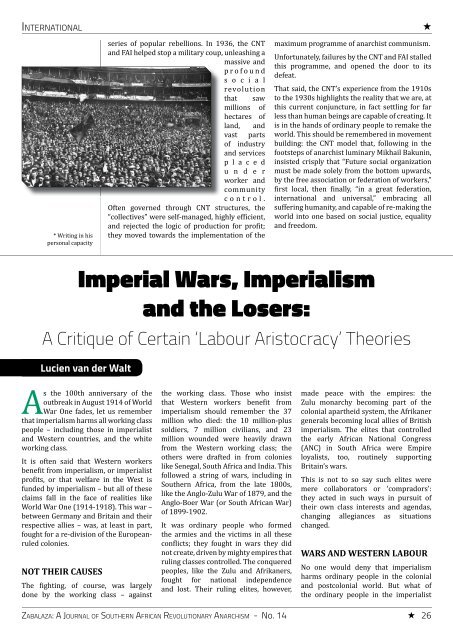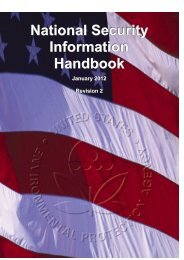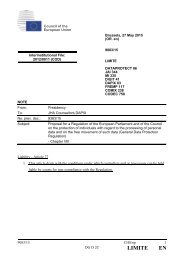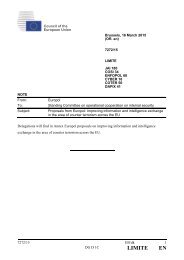INTERNATIONAL* Writing in hispersonal capacityseries of popular rebellions. In 1936, the CNTand FAI helped stop a military coup, unleashing amassive andprofounds o c i a lrevolutionthat sawmillions ofhectares ofland, andvast partsof industryand servicesp l a c e du n d e rworker andcommunitycontrol.Often governed through CNT structures, the“collectives” were self-managed, highly eficient,and rejected the logic of production for proit;they moved towards the implementation of themaximum programme of anarchist communism.Unfortunately, failures by the CNT and FAI stalledthis programme, and opened the door to itsdefeat.That said, the CNT’s experience from the 1910sto the 1930s highlights the reality that we are, atthis current conjuncture, in fact settling for farless than human beings are capable of creating. Itis in the hands of ordinary people to remake theworld. This should be remembered in movementbuilding: the CNT model that, following in thefootsteps of anarchist luminary Mikhail Bakunin,insisted crisply that “Future social organizationmust be made solely from the bottom upwards,by the free association or federation of workers,”irst local, then inally, “in a great federation,international and universal,” embracing allsuffering humanity, and capable of re-making theworld into one based on social justice, equalityand freedom.Imperial Wars, Imperialismand the Losers:A Critique of Certain ‘Labour Aristocracy’ TheoriesLucien van der WaltAs the 100th anniversary of theoutbreak in August 1914 of WorldWar One fades, let us rememberthat imperialism harms all working classpeople – including those in imperialistand Western countries, and the whiteworking class.It is often said that Western workersbeneit from imperialism, or imperialistproits, or that welfare in the West isfunded by imperialism – but all of theseclaims fall in the face of realities likeWorld War One (1914-1918). This war –between Germany and Britain and theirrespective allies – was, at least in part,fought for a re-division of the Europeanruledcolonies.NOT THEIR CAUSESThe ighting, of course, was largelydone by the working class – againstthe working class. Those who insistthat Western workers beneit fromimperialism should remember the 37million who died: the 10 million-plussoldiers, 7 million civilians, and 23million wounded were heavily drawnfrom the Western working class; theothers were drafted in from colonieslike Senegal, South Africa and India. Thisfollowed a string of wars, including inSouthern Africa, from the late 1800s,like the Anglo-Zulu War of 1879, and theAnglo-Boer War (or South African War)of 1899-1902.It was ordinary people who formedthe armies and the victims in all theseconlicts; they fought in wars they didnot create, driven by mighty empires thatruling classes controlled. The conqueredpeoples, like the Zulu and Afrikaners,fought for national independenceand lost. Their ruling elites, however,made peace with the empires: theZulu monarchy becoming part of thecolonial apartheid system, the Afrikanergenerals becoming local allies of Britishimperialism. The elites that controlledthe early African National Congress(ANC) in South Africa were Empireloyalists, too, routinely supportingBritain’s wars.This is not to so say such elites weremere collaborators or ‘compradors’:they acted in such ways in pursuit oftheir own class interests and agendas,changing allegiances as situationschanged.WARS AND WESTERN LABOURNo one would deny that imperialismharms ordinary people in the colonialand postcolonial world. But what ofthe ordinary people in the imperialistZABALAZA: A JOURNAL OF SOUTHERN AFRICAN REVOLUTIONARY ANARCHISM - No. 14 26
countries of the West? They never ruled, norcontrolled, those countries. At the time of thethree wars listed above, they did not even haveuniversal voting rights, and were still battling forbasic union rights.‘LABOUR ARISTOCRACY’ MYTHSDid they, and do they still, beneit from theimperial wars or imperialist economic activities,like Structural Adjustment or unfair terms oftrade? No. The notion that Western workersbeneit from imperialism – a version of ‘labouraristocracy’ and ‘privilege’ theories – remainsa widespread myth. If the mass deaths in thesewars – borne largely by the working class andpoor – are not enough evidence, consider alsothe crippling injuries that hundreds of thousandsfaced, or the future they looked forward to aftermilitary demobilization – of low-wage jobs andunemployment.BEYOND THE TV SCREENThe image we see today on TV and in ilms of lifein the West is a myth. Whereas on TV, even fastfood workers and sex workers live in large lats,drive their own latestmodelcars, and sit downto giant screen TVs, thereality is different. InBritain at the start of the1980s – that is, beforethe neo-liberal offensivereally got started – 10%of the population owned80% of personal wealth,while the bottom 80%owned only 10%; 32%lived in poverty, evenusing the dubiousmeasures of the time. 1It was from these massesthat the cannon fodderof the war was and arerecruited; so appalling were their living conditionsthat the state found that hundreds of thousandsfell below the required health standards forrecruitment as soldiers in 1899 and 1914.HISTORICAL CORRELATIONOf course, some sectors of the Western workingclass live relatively well, but there is no clearevidence that this is due to some sort of atransfer of wealth from the non-Western world,to Western workers by imperialism. Before theneo-liberal period starting in the 1970s, the bestliving conditions were in the Nordic countries,none of which had much in the way of anyimperial history. Living conditions in Westerncountries improved dramatically from the1940s – after the ruin of World War Two – whichcoincided precisely the period in which empiresthat had lasted centuries collapsed.By contrast, the points of greatest direct Westernimperial rule – like the ‘Victorian’ period of thelate 19th and early 20th centuries – remainnotorious as periods of massive repression andpoverty in the West. The modern Keynesianwelfare state (KWS) in the West, the basis ofwelfare, arose precisely when the Europeanempires fell. Similarly, as imperialist warsincreased from the late 1980s, working classconditions deteriorated severely, in large partdue to neo-liberalism; again, the soldiers of theUSA and other major powers were primarilyrecruited from workers looking for jobs.WAGES AND CAPITAL STRUCTUREUnequal wages exist within and betweencountries, including between and withinthose with a colonial history, but this relects arange of factors. Western countries have moreindustrialised economies: by current igures,the GDP of Germanyalone is almost twicethat of the entire regionof sub-Saharan Africa,South Africa included. 2Such economies, whichhave moved decisivelyto the production ofrelative surplus value,involve much higherproductivity per worker– this, in turn, allowmuch higher wages, aswell as higher (!) rates ofexploitation, inasmuchas the gap betweenoutput and income isproportionately worse.To illustrate: in South Africa, an autoworker ina big foreign-owned plant, with a permanentand semi-skilled job, is paid far better than aworker on a labour-intensive wine farm. Heror his output is much higher, due to technicalconditions. Let us say the output, measured interms of value added to the commodity, is (tokeep it simple) R50,000: then capital can pay awage of R10, 000 easily, and still pocket R40,000‘surplus’ value. Let us say the farmworker adds(again, simplifying) R3,000 value and gets paidR2,000. In this case, the autoworker is actuallymore exploited than the farmworker, as R40,000is extracted, as compared to R1,000.INTERNATIONALThe image wesee today on TV... of life in theWest is a myth.Whereas on TV,even fast foodworkers andsex workers livein large lats,drive their ownlatest-modelcars, and sitdown to giantscreen TVs,the reality isdifferent. InBritain at thestart of the1980s ... 10% ofthe populationowned 80%of personalwealth, whilethe bottom 80%owned only10%; 32% livedin poverty...27 ZABALAZA: A JOURNAL OF SOUTHERN AFRICAN REVOLUTIONARY ANARCHISM - No. 14







